What does it mean to be moved by love?
Researchers from UCLA and the University of Oslo have documented a complex but universally felt emotion they call kama muta — a Sanskrit term that means “moved by love.”
Researchers from UCLA and the University of Oslo have documented a complex but universally felt emotion they call kama muta — a Sanskrit term that means “moved by love.”
Kevin thanks his mother’s persistence in pursuing her own education coupled with his father’s humble nature and drive to provide a safe and secure life for his family for molding him.
Obstacles and adversity have never stopped these three first-generation college students. They’ve only served to make the siblings stronger and the family prouder.
Children arriving at the U.S. border in search of asylum are frequently a particularly vulnerable population. In many cases fleeing violence and persecution, they also encounter hunger, illness and threats of physical harm along their hazardous journey to the border.
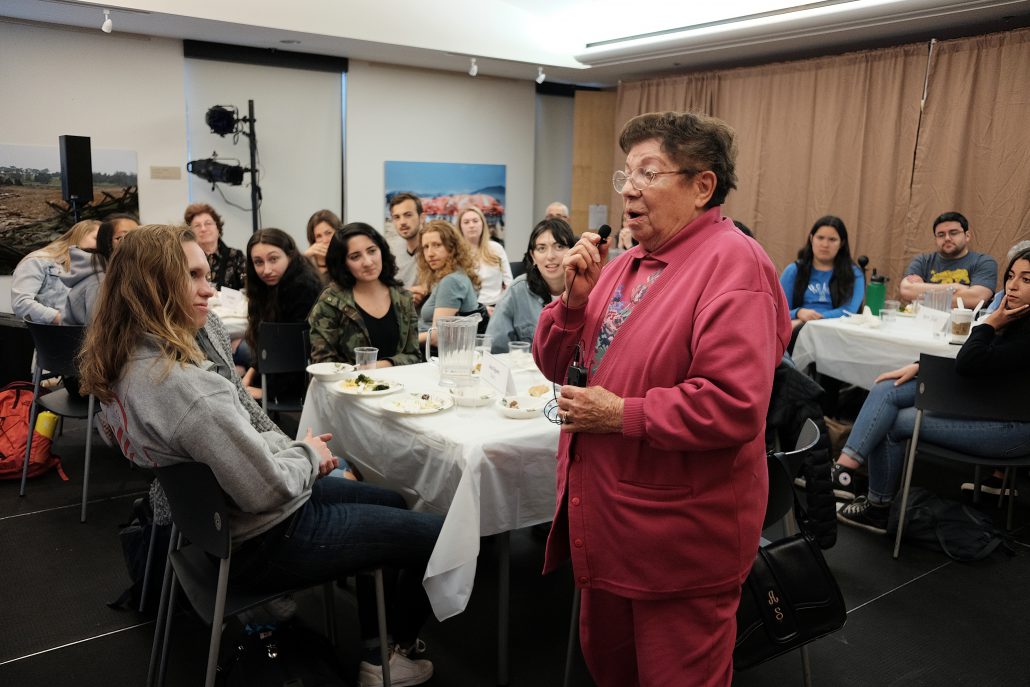
Ann Signett / Photo Credit: David Wu (UCLA Alan D. Leve Center for Jewish Studies)
At age 15, Ann Signett was surrounded by war. Every morning she would go out on her balcony and watch B17 bombers as they flew over her hometown of Rome during World War II.
Knowing that German occupation meant death for their Jewish family, Signett’s father led them to the mountain village of Alvito, 100 miles away. There, they were sheltered by a Catholic family for 10 months.
Signett’s story is just one of the personal histories that more than 100 students will hear through UCLA’s student-run Bearing Witness Program and the Fiat Lux seminar, “German 19: Bearing Witness: Interviewing Holocaust Survivors.”
Last quarter, Bearing Witness brings students together at UCLA Hillel for a total of four sessions to meet one-on-one with a group of 25 survivors. The students listen, learn, record and “bear witness” to the unique histories presented to them.
With every passing year, there is urgency on the part of survivors to get their message out. The oldest is 105 and the youngest is 76.
Signett, now 89 and surrounded by UCLA students, shares her story and hopes that it is never forgotten.
“I survived because I was hidden,” she said. “But there are survivors who survived the death camps. I was never in a death camp. I was the lucky one.”
In addition to interviewing survivors, a group of 20 students are learning about the Holocaust as part of the Fiat Lux seminar taught by Professor Todd Presner, who is the Sady and Ludwig Kahn Director at the UCLA Alan D. Leve Center for Jewish Studies.
Presner has partnered with the Bearing Witness program for the past 10 years because he wants to engage freshmen early in their academic careers. As part of his seminar, students discuss historical issues and oral histories, and visit the Los Angeles Museum of the Holocaust.
“Several students, year after year, come back and talk about their experience,” Presner said. “It deepens their interest in history, their interest in social justice issues, and their interest in community engagement.”
Nadine Avari, a freshman in the UCLA College and originally from Pakistan, was immediately drawn to the Fiat Lux course. It offered her the perfect opportunity to interact with and learn directly from Holocaust survivors.
Before coming to UCLA, Avari says she had neither experienced much diversity nor met anyone from the Jewish community.
“Many freshmen come from really small, closed communities with narrow viewpoints,” Avari said. “UCLA is a diverse campus and hearing about the survivor’s experiences is an opportunity for students to be open and experience cultural diversity.”
Now, after studying the Holocaust in Presner’s class and hearing survivors’ personal testimonies, Avari said she feels empowered to ‘bear witness’ on their behalf.
“A lot of people disagree that the Holocaust happened,” said Avari. “And I can say, ‘No, I heard it first-hand from someone who went through it.’ No one can argue with that.”
Carol Roth, 76, is the youngest of the survivors. While Roth calls herself the “baby” of the group, she says that as long as she is living, it is her responsibility to educate a new generation as well as combat Holocaust deniers.
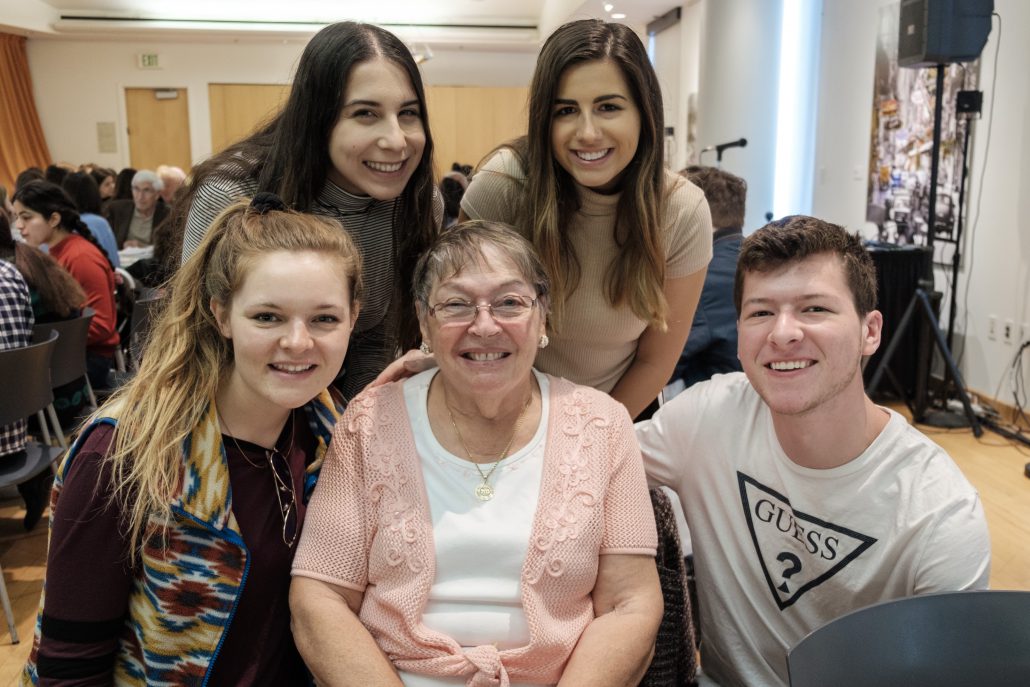
Carol Roth with students. Photo Credit: David Wu (UCLA Alan D. Leve Center for Jewish Studies)
With a shaky voice, Roth tells students of the day she was walking on the beach with her husband and saw a blimp in the sky that read, ‘The Holocaust never happened.’
“I started crying because it was horrendous,” said Roth, who is originally from Couillet, Belgium. “It’s real, believe me. My mother was arrested by Nazis on the bus only because she was Jewish. They took her to the concentration camp Auschwitz. She was never heard from again.”
Sonia Khrapkova, 80, and a native of Stalingrad, Russia (now Volgograd) is also a child survivor.
In one session with students Khrapkova shared a sobering reality, “We will go, my generation,” Khrapkova said. “I’m 80 and soon there will be no people to talk to you.”
Although Khrapkova was four years old when the Germans arrived in Stalingrad, she tells students that she remembers details from 76 years ago “like it was yesterday.”
She recalls her family’s escape during the decisive Battle of Stalingrad.
“We put logs together, and we were on Volga River,” Khrapkova said. “We were running and running. The pilots were flying above us; the river was burning; the city was so slippery from the blood.”
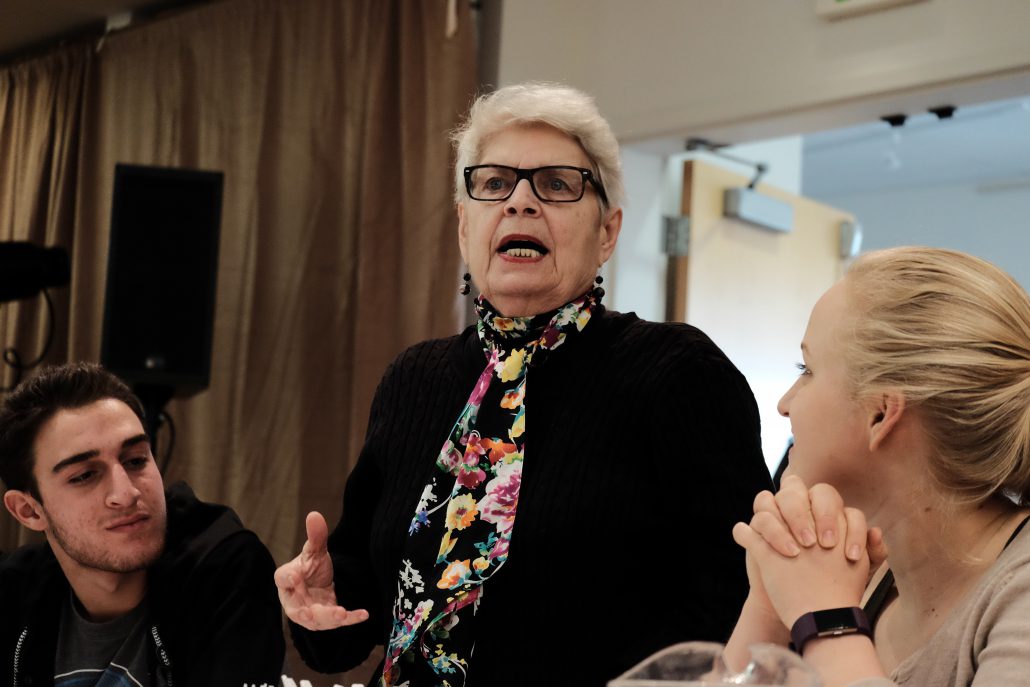
Sonia Khrapkova Photo Credit: David Wu (UCLA Alan D. Leve Center for Jewish Studies)
Senior Daniella Chernak, a communication major and co-chair of the Bearing Witness program, understands the importance of personally hearing stories from survivors like Khrapkova.
“We are the last generation to bear witness to survivor testimonials and stories first-hand,” said Chernak. “Day after day, week after week, survivors actively choose to relive the unimaginable hardships of their lives by sharing them with us.”
When Khrapkova continues her story, she speaks of fleeing to Kyrgyzstan and eventually the Ukraine. It was there, in a small forest, that she witnessed Jewish parents and their children digging their own graves and being buried alive.
“I remember the earth looked like it was breathing,” said Khrapkova, whose family was fortunate enough to survive.
Khrapkova’s tragic memories have endured throughout the decades and are now in the hands of a new generation.
“Hearing survivor testimonial is a constant reminder that we cannot stand idly by while others face atrocities,” Chernak said. “The hundreds of students who participate each year leave the program more open-minded, knowledgeable, and committed to stopping biased injustices.”
Today, Khrapkova says that Bearing Witness gives her hope that this period of history will not be forgotten and will live long after she is gone.
“These UCLA students brought back my faith in the future generation,” Khrapkova said. “I am proud.”
Andrew Rosenstein ’16, captures the stories of 16 Bearing Witness Survivors through the app “Light out of Darkness” on iTunes.
See archival interviews and read about Ann Signett’s story through the Museum of Jewish Heritage.
Special thanks to UCLA Alan D. Leve Center for Jewish Studies, UCLA Hillel, Café Europa, Jewish Family Services and The Jewish Federation of Greater Los Angeles for their contributions to this article.
“How did we get so upside down?” the activist and co-founder of the United Farm Workers asked an enthusiastic audience. Her talk, UCLA’s sixth annual Winston C. Doby Distinguished Lecture, was Feb. 28 at the Fowler Museum’s Lenart Auditorium.
“In part, we hope this serves as tool for artists, producers, writers, directors and actors who are seeking funding and support for future projects that appropriately and creatively reflect the gender and ethnic diversity of the United States.”
In a roundtable discussion with UCLA students and Chicago entrepreneurs at Startup UCLA on Feb. 12, Chicago Mayor Rahm Emanuel was adamant that despite all his career accomplishments, it is his failures, not his successes, that continue to teach him his biggest lessons.
For the students in the room, it was exactly what they needed to hear.
“Being young it’s always great to hear advice from someone who’s achieved great success in his career about how we can do that for ourselves,” said fourth-year statistics major Parker Mansfield. “[And to hear about] the mindset we should have while trying to do that and what we should look for on our journey to success.”
Emanuel served in the White House during the Obama and Clinton administrations as chief of staff and senior a dvisor to the president for policy and strategy, respectively, and was a three-term U.S. Representative for Illinois’s 5th congressional district. He has served as mayor of the city of Chicago since 2011.
The roundtable was part of Emanuel’s daylong visit to UCLA, which included delivering the keynote address for the 2018 UCLA College Luskin Lecture for Thought Leadership at UCLA Royce Hall.
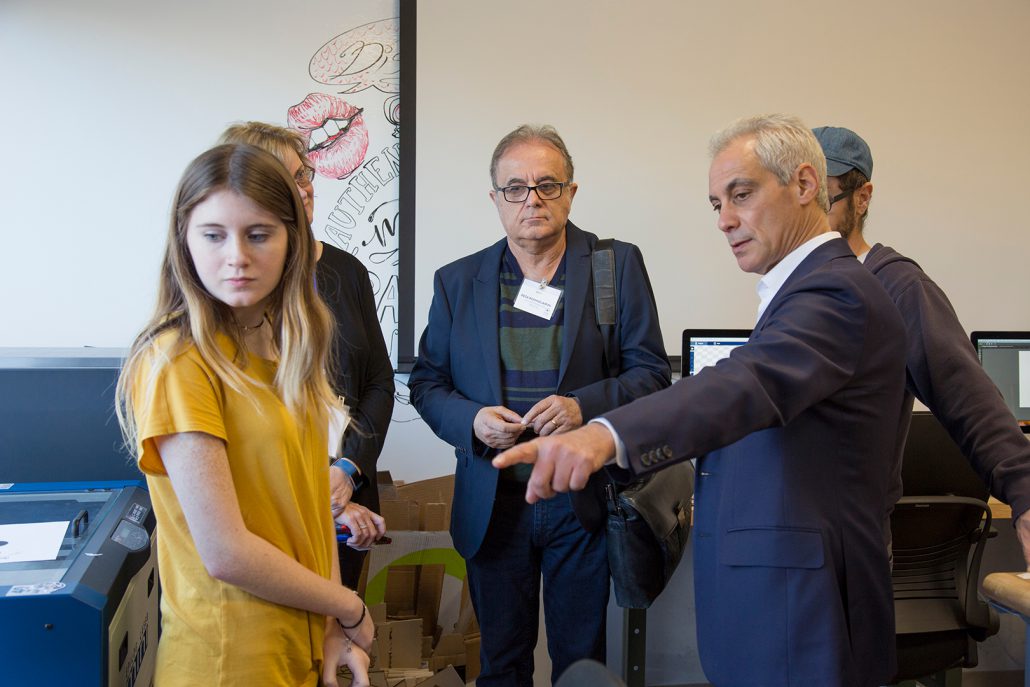
Mayor Emanuel visited students in the Maker Space to hear more about their opportunities to experiment with new technologies.
In the afternoon before the lecture, Emanuel visited Startup UCLA with a delegation of Chicago-based technology leaders as part of the Think Chicago Roadshow, Emanuel’s and World Business Chicago’s initiative to visit universities across the country to attract the next generation of tech leaders to the city.
The group toured the Maker Space in Rieber Hall, where students can use 3D printers, laser cutters, software and other tools to create their own projects, and had a peek at the Design & Innovation Living Learning Community in Sproul Hall, which cultivates students’ passions and pursuits around technology, innovation and the entrepreneurial spirit.
Emanuel and the entrepreneurs then sat down with seven undergraduate and two graduate students who had been invited because of their various interests in entrepreneurship. Emanuel discussed efforts to foster a culture of innovation and business leadership in Chicago, and he and the delegation shared their advice for finding success in the entrepreneurial world.
Emanuel shared his vision for Chicago as a city that welcomes and supports business leaders and innovators of all kinds, not just major corporations. He outlined the initiatives he has implemented in order to position Chicago as a hub of innovation, education and business, demonstrating that public policy and entrepreneurship can complement each other and allow both companies and communities to thrive together.
Second-year mechanical engineering major Nikhil Pawar noted that while he has met several technology leaders before, this was the first time he’d had the chance to hear directly from a leader in public service.
“Hearing about the social space, which is something I’m trying to marry into my work, was incredibly useful,” Pawar said.
Anshul Aggarwal, a third-year computer science major, asked Emanuel for his advice on risk management: How does he determine whether an investment of time, money, energy or resources is worthwhile?
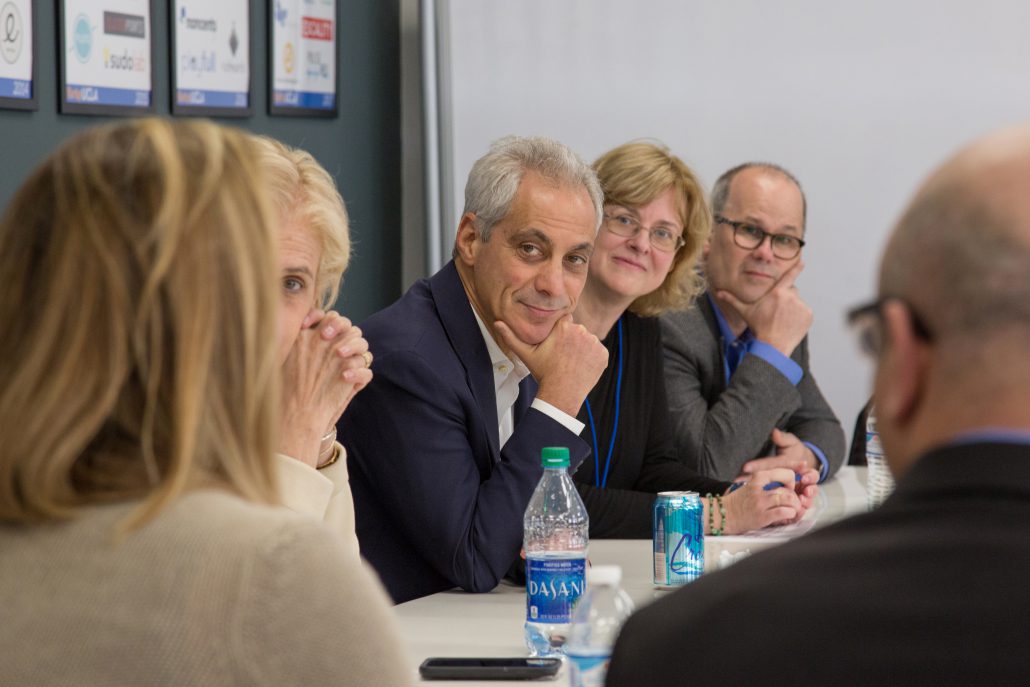
Chicago business and innovation leaders joined the mayor to share key career insights with students.
“You have to evaluate what I call the pain/pleasure principle,” Emanuel said. “How much political pain is it going to take to get this and at the end of the day, is it worth it? You’ve got to decide what’s really important and worth taking a swing at and, sometimes you’re going to let other ones just go by.”
Aggarwal said Emanuel’s insights would stay with him for a long time since he sometimes struggles to decide whether a new project is worth taking on.
But Emanuel struck the biggest nerve when he encouraged the students not to be afraid to try something new and to embrace failures as necessary for success. He pointed to two low points in his life—when he nearly died as a teenager and when he was briefly fired from the Clinton administration—as the events that taught him more about his capabilities than any other achievement in his life.
“If you haven’t failed yet, you haven’t succeeded yet,” Emanuel said. “It is better to try and fail than to resent that you never tried.”
Frances Lai, a third-year cognitive sciences major, said Emanuel’s words reassured her that she’s still young and has a lot of time to do something with her life.
Having the opportunity to meet Emanuel and listen to his insights in such an intimate setting “means the world,” Aggarwal said.
“I’m the type of person who learns best finding out what other people have done, seeing what worked for them and applying it,” he said. “[Emanuel and the delegation’s] experiences are something we’re eventually going to go through as well and it’s exciting to be able to see the kinds of things they’ve done and see if we can take that into our lives as well.”
Startup UCLA Executive Director Deanna Evans hopes the students will be inspired by the once-in-a-lifetime experience of participating in a roundtable with Emanuel and the Chicago entrepreneurs.
“The advice he gave them may affirm their current career aspirations or set them on an entirely new course, possibly moving to Chicago to start their career,” Evans said. “I look forward to talking with these students in the future to see how this experience shaped their career journey.”
The Cherry Award honors outstanding professors who are extraordinary, inspiring teachers with a positive, long-lasting effect on students and a record of distinguished scholarship.
Priority enrollment for summer 2018 opened on February 1, which means that students like Arpi Beshlikyan are already deciding whether to catch up, get ahead or explore future careers.
“I plan on taking two prerequisite courses this summer, Physics 4BL and Computer Science 180,” said Beshlikyan, a second-year computer science and engineering major. Her goal is to have more room in her schedule during the regular academic year to take interesting electives.
She’ll join more than 12,000 other UCLA students who choose to enroll each summer. With 1,000+ new and popular courses as well as intensive summer institutes, UCLA Summer Sessions provides opportunities for incoming, current and visiting students to fulfill graduation requirements, take courses outside their majors and prepare for life after graduation.
Beshlikyan pointed out that since there is no unit minimum during Summer Sessions, she can take only those two courses, allowing her to focus without splitting her time between other courses plus extracurricular activities.
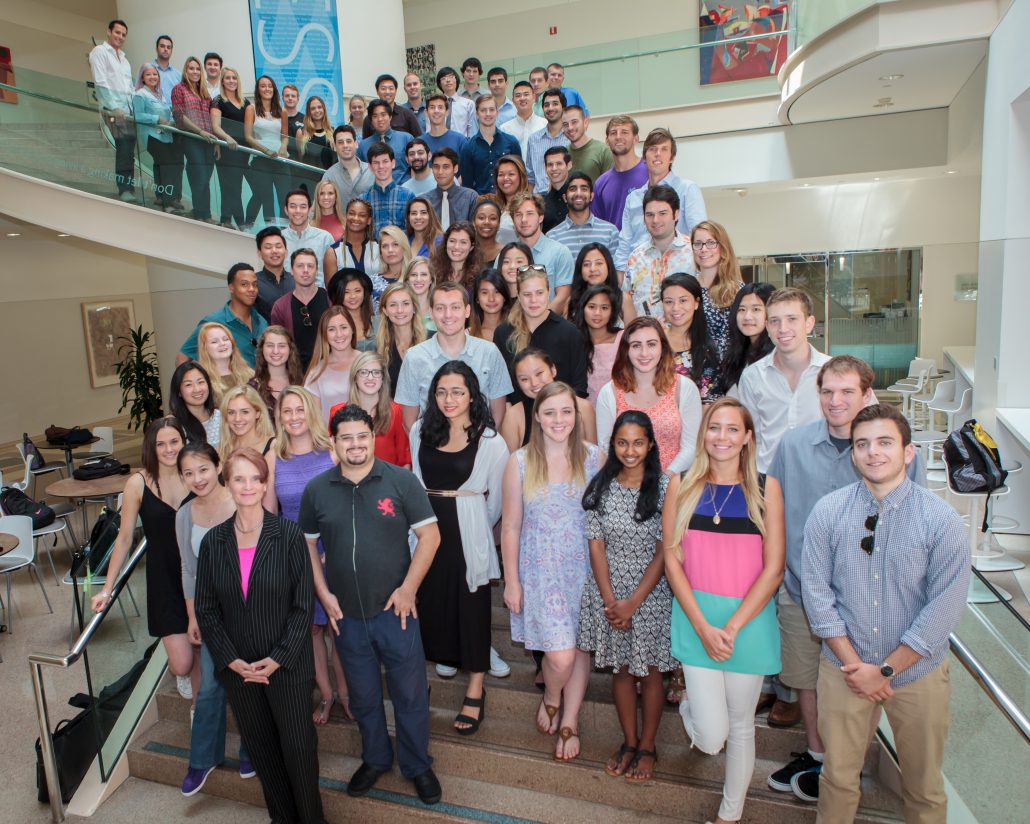
With the campus population at less than half its normal size, Beshlikyan looks forward to enjoying the summer weather and less crowded campus.
“I like the campus when it’s quieter,” she said. “There’s less people and there’s a different feel to it. And it’s easier to find places to study.”
For students who may not be in Los Angeles over the summer, select academic courses are offered online.
Kya Williamson, a fourth-year art major and African American studies minor, took History 10A online during Summer Sessions after her second year. While her mom urged her to take a course so she’d have something to do over the summer, Williamson was excited for the opportunity to learn about the history of American slavery from renowned scholar Robin Kelley, Distinguished Professor and holder of the Gary B. Nash Endowed Chair in U.S. History.
Online courses allow students to complete the readings and assignments in their own time and some discussion sections are conducted via webcam, encouraging all students to be accountable and engaged in the course.
“As long as you stay on top of your work, [online courses] are a great way to get credits,” Williamson said.
Non-resident supplemental tuition is not assessed over the summer, making summer the most affordable time of year for non-California residents to take courses at UCLA.
Students can also flex their creativity and explore future career options through UCLA Summer Institutes, which last from four to eight weeks and attract students from the top universities in the country as well as international students. Taught by UCLA faculty with topics ranging from architecture to management, these intensive programs allow students to immerse themselves in a field they’re interested in or try out an area of study they’re considering.
Carlie Heuple, a third-year communications and psychology double major, participated in the 2017 Managing Enterprise in Media, Entertainment and Sports (MEMES) Summer Institute offered by the UCLA Anderson School of Management, which introduces students to entertainment and sports marketing and management.
“The [MEMES] Summer Institute helped with my career goals because it introduced me to so much knowledge as well as people that have helped connect me in so many ways,” said Heuple, who sought to expand her knowledge of the sports industry but ended up with much more than that. “I secured an amazing internship for six months solely due to my participation in this course and the help of Professor Mark Francis.”
Registration for summer academic courses is now open for UCLA students. Registration for visiting students opens February 15. Registration for Summer Institutes opens February 15. The Summer Opportunities Fair is on February 13. More information on summer 2018 courses and programs is available on the UCLA Summer Sessions website.
![]()
1309 Murphy Hall
Box 951413
Los Angeles, CA 90095-1413
(t) (310) 206-1953
(f) (310) 267-2343
